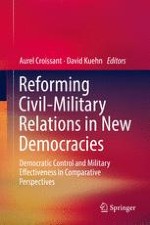2017 | OriginalPaper | Buchkapitel
7. Civilian Control and Defense Policy in Indonesia’s Nascent Democracy
verfasst von : Aditya Batara Gunawan
Erschienen in: Reforming Civil-Military Relations in New Democracies
Aktivieren Sie unsere intelligente Suche, um passende Fachinhalte oder Patente zu finden.
Wählen Sie Textabschnitte aus um mit Künstlicher Intelligenz passenden Patente zu finden. powered by
Markieren Sie Textabschnitte, um KI-gestützt weitere passende Inhalte zu finden. powered by
